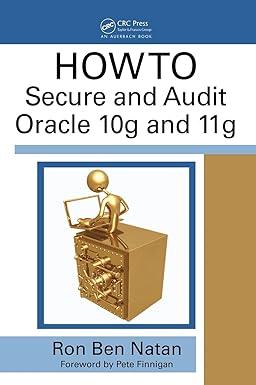Question
Question 10.Which of the following is not a proper use of notes to the financial statements? (Points : 2) To describe the nature and effect
| Question 10.Which of the following is not a proper use of notes to the financial statements? (Points : 2) |
To describe the nature and effect of a change in accounting principle, such as from FIFO to LIFO To explain the decrease in gross margin and next years plan To describe a firm's debt To indicate the basis for asset valuation To indicate the method of depreciation
| 12. Which of the following statements about the various 2012 financial schedules is correct? (Points : 2) |
The income statement for the year ended 12/31/2012 reports the balance in the cash and cash equivalents account The balance sheet as of 12/31/2012 reports the account balances as of 12/31/2012 The income statement for the year ended 12/31/2012 reports the income for the last day of the year The balance sheet for the year ended 12/31/2012 reports the change in account balances from 12/31/2011 to 12/31/2012 The balance sheet for the year ended 12/31/2012 reports earnings per share as of 12/31/2012
| Question 13. Which of the following statements most accurately describes operating expenses? (Points : 2) |
Operating expenses include period expenses associated with core operations that cannot be matched to revenues Operating expenses are the cost of goods sold associated with the revenues they helped generate Operating expenses include extraordinary gains and losses Operating expenses exclude expenses such as depreciation on manufacturing equipment Operating expenses include a manufacturers interest income and interest expense
| 14. Which of the following statements is the most accurate regarding GAAP requirements for reporting the value of balance sheet accounts on a companys year-end financial statements? (Points : 3) |
Accounts receivable are to be valued and reported at fair market value; Property, Plant & Equipment are required to be valued and reported at historical cost net of accumulated depreciation Accounts receivable are required to be valued and reported at net realizable value; Property, Plant & Equipment are required to be valued and reported at historical cost net of accumulated depreciation It depends on the companys accounting policies. All statements are options under GAAP Accounts payable are required to be valued and reported at net present value: Equity is required to be valued and reported at fair market value Held to maturity investments in bonds are required to be valued and reported at fair market value; Accounts payable are required to be valued and reported at net present value
Step by Step Solution
There are 3 Steps involved in it
Step: 1

Get Instant Access to Expert-Tailored Solutions
See step-by-step solutions with expert insights and AI powered tools for academic success
Step: 2

Step: 3

Ace Your Homework with AI
Get the answers you need in no time with our AI-driven, step-by-step assistance
Get Started


